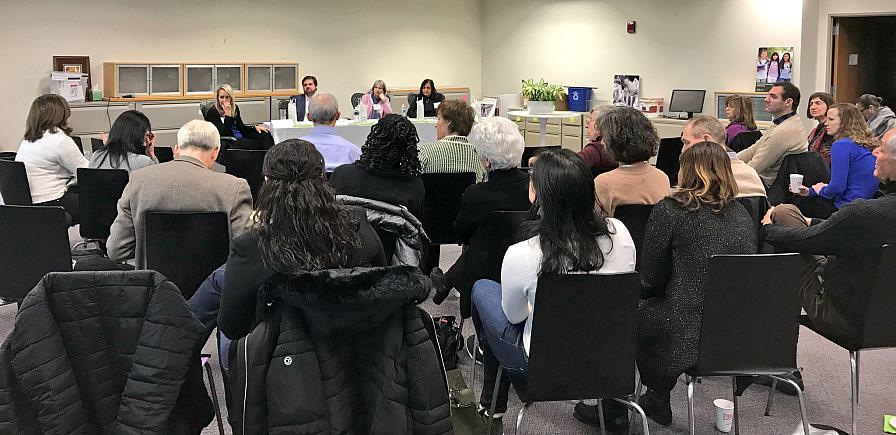
Stephanie Dodson Cornell (Left) moderates a panel featuring Ben Powell, Susan Musinsky, and Shruti Sehra on February 2, 2018
Welcome Wyona Lynch-McWhite, SIF's New Executive Director!

Stephanie Dodson Cornell (Left) moderates a panel featuring Ben Powell, Susan Musinsky, and Shruti Sehra on February 2, 2018
On February 2, Social Innovation Forum hosted a panel discussion on the role intermediaries play in accelerating social change. In this guest blog post, moderator Stephanie Dodson Cornell of Draper Richards Kaplan shares her perspective on the conversation.
As funders and collaborators supporting the hundreds of thousands of social ventures in the world, we have collectively put tremendous effort into sorting through what works in solving challenging social problems. The story we often miss is the critical role of intermediaries in the field.
The social venture marketplace created by intermediaries is a gathering point for stakeholders interested in solutions.
Intermediaries are the entities that create the intentional ecosystem which is necessary for social ventures to do their work. Intermediaries support rising organizations in a consultative capacity, provide critical technical assistance, offer advice and guidance, build a network of supportive funders, bring entrepreneurs and leaders together. Without intermediaries, social ventures expend huge additional energy to build their capacity. Without intermediaries, social ventures and their teams are often isolated and without a means of becoming known and supported in their communities.
A snowy day in Boston did not dissuade a roomful of funders and collaborators from gathering in Social Innovation Forum’s welcoming, new space for an engaged discussion on the role of intermediaries. I joined Ben Powell from Agora Partnerships (working in Latin America), Shruti Sehra from New Profit, and Susan Musinsky from Social Innovation Forum as they engaged the room in a great discussion.
Ben Powell chose the name Agora Partnerships for his work in Latin America because Agora is the Greek word for “marketplace.” He and Susan Musinsky agreed that the social sector does not have a natural marketplace, and therefore an intermediary plays a critical role in building a “central square” in which people come together to make important decisions and exchange goods and ideas. The social venture marketplace created by intermediaries is a gathering point for stakeholders interested in solutions: investors, funders, activists, nonprofit leaders, and university leaders can all participate in collectively building momentum for social ventures that are solving sticky community issues.
Shruti Sehra also weighed in with the idea that an intermediary can serve as an important backbone organization that convenes stakeholders tackling a social issue from different angles and parts of the system to collaborate. In a pressure cooker world for social ventures, the intermediary can provide a safe space for both entrepreneurs and funders. New Profit works to build a space for important conversations to happen about what organizations can do together that no one organization could do alone. Without that safe space and those important conversations, individual organizations are working in a vacuum.
As testament to the transformation that can happen when an intermediary is supporting the work of a nonprofit, Mickey Cockrell from Catie’s Closet noted that, despite 30 years as a senior executive in retail, when she started her new venture, she was in a new world in which she had no experience in how to navigate networks, build connections, and gather knowledge. The support she received from Social Innovation Forum and Draper Richards Kaplan, along with others, gave her an effective marketplace in which to build her venture.
About the Author
Stephanie Dodson Cornell is a Managing Director at Draper Richards Kaplan, where she is responsible for identifying and supporting DRK Entrepreneurs. She currently serves on the boards of DRK portfolio organizations Catie’s Closet, City Health Works, Clean Energy Trust, Crisis Text Line, D-Rev, IRAP, Lava Mae, Upstream, StrongMinds and Y2Y Harvard Square.